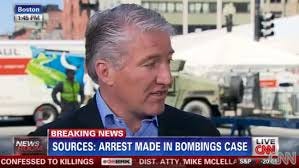The Boston Marathon Bombings and the Importance of Getting the Story Right

I don’t like second guessing journalists who are covering breaking news, especially on live television. It’s not easy. Early on the story is changing by the second and it’s hard to stay on top of each new development. So mistakes are going to be made. And in the Boston Marathon bombing story, journalists got an awful lot wrong.
Important mainstream news organizations reported that more than two bombs were found. The venerable Associated Press citing a “senior in U.S. intelligence official” said, “Two more explosive devices have been found near the scene of the Boston marathon where two bombs detonated earlier.” The Wall Street Journal put the number at 5. Wrong.
CNN, where America supposedly goes for news when something big happens, said a suspect was in custody. Wrong.
To make matters worse, CNN said he was “a dark-skinned individual.” Wrong.
The New York Post said there were “at least” 12 people dead. Wrong.
The same paper put the picture of two innocent young men on its front page under a headline that read “Bag Men.” Wrong.
They said a Saudi national was a person of interest. Wrong.
New York Times columnist Nicholas Kristof couldn’t resist the temptation to inject his liberal politics into the story. On Twitter he wrote: “Explosion is a reminder that ATF needs a director. Shame on Senate Republicans for blocking apptment.”
He later apologized, saying it was a “low blow and I take it back.”
In the fog of war – and two bombs going off with the intent to kill and maim innocent civilians is a kind of war -- journalists will get things wrong. So those of us who were watching from the comfort of our living rooms, shouldn’t be too harsh. But reporters need to be called on their many mistakes – because their self-inflicted wounds hurt all of us.
Every reporter wants to get the big scoop, they all understandably want to be first with an important break in the story. But there’s a price to pay for such ambition: Your audience will stop believing you. I did.
Remember that stick up at the 7-11, supposedly pulled off by the brothers? I still don't know if that really happened. You heard the story about how they hijacked an SUV and confessed to the driver that they were the bombers? Did they really confess or did the press get that one wrong too?
After a while whenever a TV reporter went on the air to report something new I said to myself, “Yeah, sure. I’ll believe it when I see it.” This is not good for an American institution whose credibility rating is somewhere around that of used car dealers. In a free country we need a mainstream media that we trust.
But there’s another group that has gotten off way too easy: those supposedly reliable, credible, highly placed sources. Journalists didn’t make up their false information. They didn’t concoct a single "fact" to boost their ratings or their personal reputations. Every piece of incorrect information came from those reliable, credible, highly places sources – in law enforcement.
Let’s go behind the curtain to see how this could happen.
FBI sources on the scene, the ones who knew the most, clammed up early. They weren’t sharing what they knew with the media. So reporters had to depend on other sources who wanted to be in the loop, even though they weren’t. These incredible sources needed to feel like they were in on the action so they passed along whatever they had --rumors, gossip, unreliable stuff they picked up on the grapevine -- to journalists anxious for any crumb they could get.
When something terrible happens, television is where most of us (who aren’t following the “news” on Twitter) go to find out what’s going on. And television did a good job a lot of the time. They let us in on the action as it was unfolding. To me, the TV coverage in Boston was like a reality show: when something wild was going on it was fascinating; when nothing was going on – which was most of the time – it was painful in a way that watching paint dry can be painful. How many times can you watch the first bomb going off before you scream, “ENOUGH!”
Journalists should learn from their mistakes, but what's a reporter to do when a supposedly credible law enforcement official tells a journalist he has information that is accurate? What's the reporter supposed to do when he gets the same wrong information from more than one "credible" source?
So the next time something terrible happens journalists will want to be first with the big scoop all over again. That's how it should be. It’s in their DNA. Reporters will want to believe what their sources tell them. And there’s a 100 percent chance a lot of the information will be dead wrong, again. And a crucially important American institution will lose yet more of its precious credibility while the unreliable sources get off easy.




